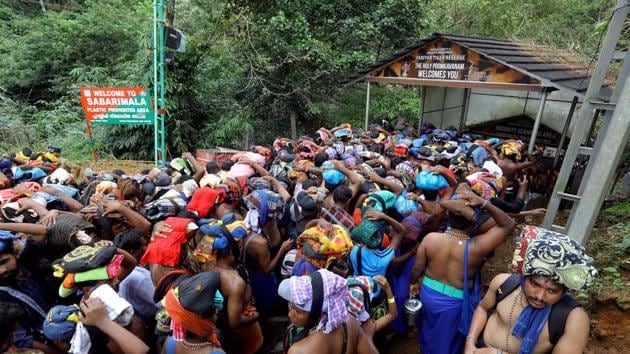Sabarimala case: 65-year-old law in the spotlight
The questions framed by the November 14 Sabarimala judgment of the five-judge bench allowing women of all ages to enter the temple for consideration by the nine-judge bench would mean that the test would now come under the scanner of the court.
The nine-judge Supreme Court bench hearing the case concerning the entry of women into Kerala’s Sabarimala Temple could end up overhauling the law, which governs the manner in which courts interfere in religious matters. This is because the bench is all set to reconsider the verdict popularly called the Shirur Mutt judgment. The verdict was delivered in April 1954 and laid down the essential religious practices test, which has been the basis for courts pronouncing on issues touching upon religion and religious practices.

As per this test, whether a practice is integral to a religion or not should be decided with reference to the doctrines of that religion. A religious denomination or organisation, the court had held, enjoys complete autonomy in the matters of deciding as to what rites and ceremonies are essential according to the tenets of the concerned religion. No outside authority has any jurisdiction to interfere with their decision in such matters, the court had said.
In the subsequent years, the Supreme Court in various matters went on to consider what would constitute an essential or integral practice of a religion thereby assuming a theological mantle. The judgment, therefore, led to a judge-centric approach when dealing with matters relating to religion and religious practices.
This was accepted by Justice DY Chandrachud who during the hearing of the Sabarimala case in July 2018 remarked that it was a “problem with our jurisprudence”.
“There is a problem with our jurisprudence. Essentiality aspect has taken charge of Article 25 [freedom of religion] but it should not be so. Because if something is essential, it becomes inviolable. Due to this essentiality doctrine, judges including Supreme Court judges are now assuming a theological mantle which we are not expected to do.”
The questions framed by the November 14 judgment of the five-judge bench allowing women of all ages to enter the temple for consideration by the nine-judge bench would mean that the test would now come under the scanner of the court.
This is because some of the questions framed by the five-judge bench clearly point to the court’s inclination to reconsider the essential religious practices test.
“The Supreme Court in all probability will reconsider the law [in Shirur Mutt judgment] which governed the field for 65 years,” said advocate Usha Nandini, who is one of the review petitioners in the Sabarimala case.






